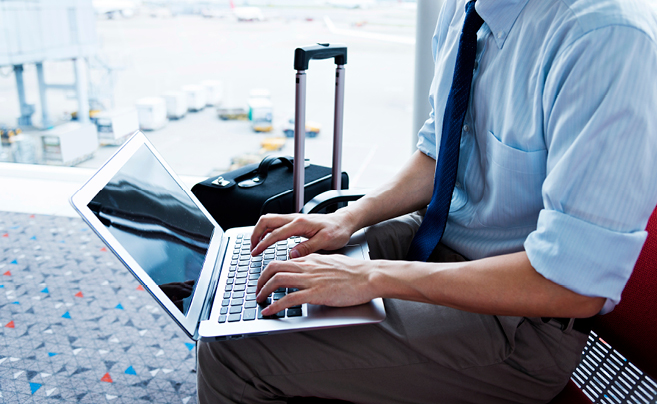There’s nothing that will throw off your productivity like travel.
You fall out of your routines. There are the impacts of jet lag, time zone issues, limited access to healthy foods you usually eat, and then there’s the meetings.You pack as much as possible into your trip, and then curse yourself as you run from back-to-back meetings for doing so.
When you get home it can take up to a week to get back to your good habits and routines. That is, if you ever get back to them.
And then you’re off again. Rinse and repeat. Taxi, airport, hotel, office, home. pac executive’s ‘2015 Workplace Productivity’ survey found that nearly 36% of workers see their personal performance impacted by travel requirements, not to mention the impacts on their health and relationships.
It is possible to be productive when travelling, however it takes preparation, communication, and you need to become a stickler for routine.
8 tips to stay productive while travelling
1. Build time into your schedule for exercise
Your keystone habits are the small wins you achieve by consistently repeating good habits that lead to other small wins throughout your day.
Exercise is a keystone habit because it correlates well with healthy eating, clearer thinking, and it’s great for helping you recover from jet lag. Build time for workouts into your schedule. This may mean flying into town early and hitting the gym upon arrival, or scheduling gym sessions with colleagues and friends at your destination.
Making time for exercise while travelling provides cognitive benefits while travelling, however you’ll also find that it’s easier to pick your usual routines up when you get home.
2. Schedule in time for communication
Often when we travel we find it hard to keep in contact with our clients, team members, and families, particularly if we’re in another time zone.
Decide before you leave when you will check and respond to your email while you’re away (you’ll need two-to-three 30-minute blocks each day), when you will talk to your team, and when you’ll call home to check in.
Encourage team members to have a list of questions ready for these conversations, and to expect answers to any queries during these times so they can manage expectations with their stakeholders and plan accordingly.
3. Communicate your schedule
Give the people at your destination your flight number because if your plane is delayed you may not be able to email them or call to let them know.If you have packed your schedule with meetings, let people know that there’s a chance you’ll be running late.
Let your team know where you’ll be, and when and who you are seeing as they may have insights that come up to share with you prior to important meetings.
4. Give loyalty
When you stick to one airline or hotel you start to learn the most efficient way to deal with them. You develop habits for working in each city, and often you’re given handy perks like priority check-in, boarding, and lounge services.
Such perks and efficiencies can save you time, which you can then invest elsewhere.
5. Think about your wardrobe
Think about the fabrics and comfort of the clothes you’re wearing, and the practicalities of your accessories. When you travel you might sit for hours and then head straight into an important meeting. Fabrics like Merino wool offer better odour resistance.
Invest in shoes that are comfortable to walk in even if it means packing a comfortable pair for walking through the airport and running around town.
These days we also have access to business and corporate wear that doesn’t require ironing. These kinds of wardrobe choices not only save you time while travelling, they keep you fresh.
6. Make Healthy Eating Choices
Complimentary food on most flights is packed with sugar and other undesirable ingredients. Don’t eat them. Instead, eat a healthy meal before you head off and ask for extra water inflight.
Ideally, carry snacks to sustain you if you miss a meal for some reason. The alternative is usually the vending machine. Chocolate isn’t breakfast, chips aren’t dinner.
7. Avoid the ‘while you’re in town’ trap
If you work in another location and travelling frequently between offices, you may find colleagues want to talk to you about subjects ‘while you’re in town’ that could be more efficiently handled over the phone. Don’t get caught in this trap unless the subject really needs an in-person meeting. You’ll end up feeling like you’re running on a treadmill and getting nothing done.
Save your time for high-value work and interactions.
8. Put aside recovery time when you get home
When you get home, block out time to get your routines back in order. If you’ve gone through an extensive travel period don’t overschedule yourself when you get home. Take a day or a half-day to recalibrate where possible. Even better, have a work from home day to catch up on anything you’ve missed.
It’s all about guarding your habits and routines and maintaining your focus on your outcomes.





